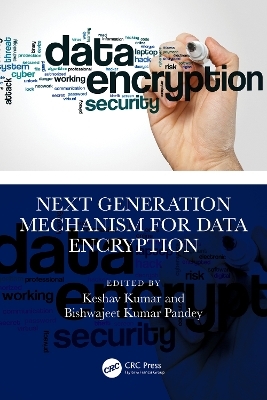
Next Generation Mechanisms for Data Encryption
CRC Press (Verlag)
978-1-032-83284-5 (ISBN)
This book gives readers a deep insight into cryptography and discusses the various types of cryptography algorithms used for the encryption and decryption of data. It also covers the mathematics behind the use of algorithms for encryption and decryption.
Features
Presents clear insight to the readers about the various security algorithms and the different mechanisms used for data encryption.
Discusses algorithms such as symmetric encryption, asymmetric encryption, digital signatures, and hash functions used for encryption.
Covers techniques and methods to optimize the mathematical steps of security algorithms to make those algorithms lightweight, which can be suitable for voice encryption.
Illustrates software methods to implement cryptography algorithms.
Highlights a comparative analysis of models that are used in implementing cryptography algorithms.
The text is primarily written for senior undergraduates, graduate students, and academic researchers in the fields of electrical engineering, electronics and communications engineering, computer science and engineering, and information technology.
Keshav Kumar is an Assistant Professor at Parul University, Gujrat, India. He is pursuing his PhD in the field of deep learning from Lingayas Vidyapeeth, Faridabad, India. He has worked with Chandigarh University, Punjab,India (NIRF 29). He has completed his Master of Engineering in ECE with a specialization in Hardware Security from Chitkara University, Punjab, India. He has also worked as a JRF with NIT Patna and as an Assistant Lecturer at Chitkara University, Punjab, India. He has authored and coauthored 5 Books, 3 with Taylor & Francis CRC Press (1 Published, 2 books are under publication), 1 Book (Accepted with Apress Springer), 1 Book (Accepted with Nova Science) and over 45+ research papers in the field of hardware security, green communication, low-power VLSI design, machine learning techniques, and the Internet of Things (IoT). He has also worked with professors from 20 different countries. His areas of specialization include deep learning, hardware security, green communication,low-power VLSI design, machine learning techniques, Wireless Sensor Networks (WSN), and IoT. He has experience teaching Python programming, embedded systems, IoT, computer networks, and digital electronics. He is also associated with Gyancity Research Consultancy Pvt Ltd. He is also a member of (IAENG). His work has been cited more than 600 times, according to Google Scholar, with an h-index of 14 and 12, according to Google Scholar Scopus, respectively. Dr. Bishwajeet Kumar Pandey Dr. Bishwajeet Kumar Pandey is a Professor at GL Bajaj College of Technology and Management, Greater Noida, India. He is a Senior Member of IEEE since 2019. Dr. Bishwajeet Pandey holds an MTech in Computer Science and Engineering from the Indian Institute of Information Technology, Gwalior, India, and a PhD in Computer Science from Gran Sasso Science Institute, Italy. He has taught at esteemed institutions such as Chitkara University Chandigarh, Birla Institute of Applied Science Bhimtal, Jain University Bangalore, Astana IT University Kazakhstan, Eurasian National University Kazakhstan (QS World Rank 321), and UCSI University Malaysia (QS World Rank 265). Dr.Pandey is a prolific researcher, with 11 published books, 196 research papers indexed in Scopus, 45 papers in SCIE and a total 296 papers. He has garnered over 3,600 citations and holds an H-index of 28. His leadership roles include serving as the Research Head of the School of Computer Science and Engineering at Jain University Bangalore from 2021 to 2023, and as the head of the International Global Academic Partnership Committee at Birla Institute of Applied Science Bhimtal from 2020 to 2021. In 2023, Dr. Pandey was honored with the prestigious Professor of the Year Award at Lords Cricket Ground by the London Organisation of Skills Development. Beyond his outstanding research output, his greatest strength lies in his global academic network. He has visited 49 countries, participated in 105 international conferences, and co-authored papers with 218 professors from 93 universities across 42 nations.
1. Oepning the Vault for Securing the Communication: An Introduction to Cryptography. 2. Guardians of Privacy: Unrevaling Public-Key Cryptography. 3. Cryptography Algorithms to Prevent the Different Security Attacks. 4. Hash Functions and Message Digest. 5. Quantum Cryptography. 6. Cryptanalysis using Crypt Tool and Alpha Peeler. 7. Quantum Cryptography: An In-Depth Exploration of Principles and Techniques. 8. Securing Patient Information: A Multi-layered Cryptographic Approach in IoT Healthcare. 9. Exploring Advancements, Applications, and Challenges in the Realm of Quantum Cryptography. 10. Cryptography in Industry: Safeguarding Digital Assets and Transactions. 11. Cryptography in Practice. 12. Output Load Capacitance Scaling Based Low Power Design of ECC Algorithm. 13. Implementation of Lattice Based Cryptography Cyber Forensic System. 14. Cryptography in Digital Forensics. 15. Cryptography Tools in Ethical Hacking. 16. Exploring the Future Trends of Cryptography. 17. Safeguarding the Future through the Prevention of Cybercrime in the Quantum Computing Era. 18. Low Power Design of DES Encryption Algorithm on 28 nm FPGA Using HSTL IO Standard.
| Erscheinungsdatum | 07.12.2024 |
|---|---|
| Zusatzinfo | 24 Tables, black and white; 53 Line drawings, black and white; 51 Halftones, black and white; 104 Illustrations, black and white |
| Verlagsort | London |
| Sprache | englisch |
| Maße | 156 x 234 mm |
| Gewicht | 453 g |
| Themenwelt | Mathematik / Informatik ► Informatik ► Software Entwicklung |
| Informatik ► Theorie / Studium ► Kryptologie | |
| Technik ► Elektrotechnik / Energietechnik | |
| Technik ► Nachrichtentechnik | |
| Technik ► Umwelttechnik / Biotechnologie | |
| ISBN-10 | 1-032-83284-3 / 1032832843 |
| ISBN-13 | 978-1-032-83284-5 / 9781032832845 |
| Zustand | Neuware |
| Informationen gemäß Produktsicherheitsverordnung (GPSR) | |
| Haben Sie eine Frage zum Produkt? |
aus dem Bereich


